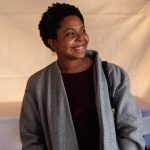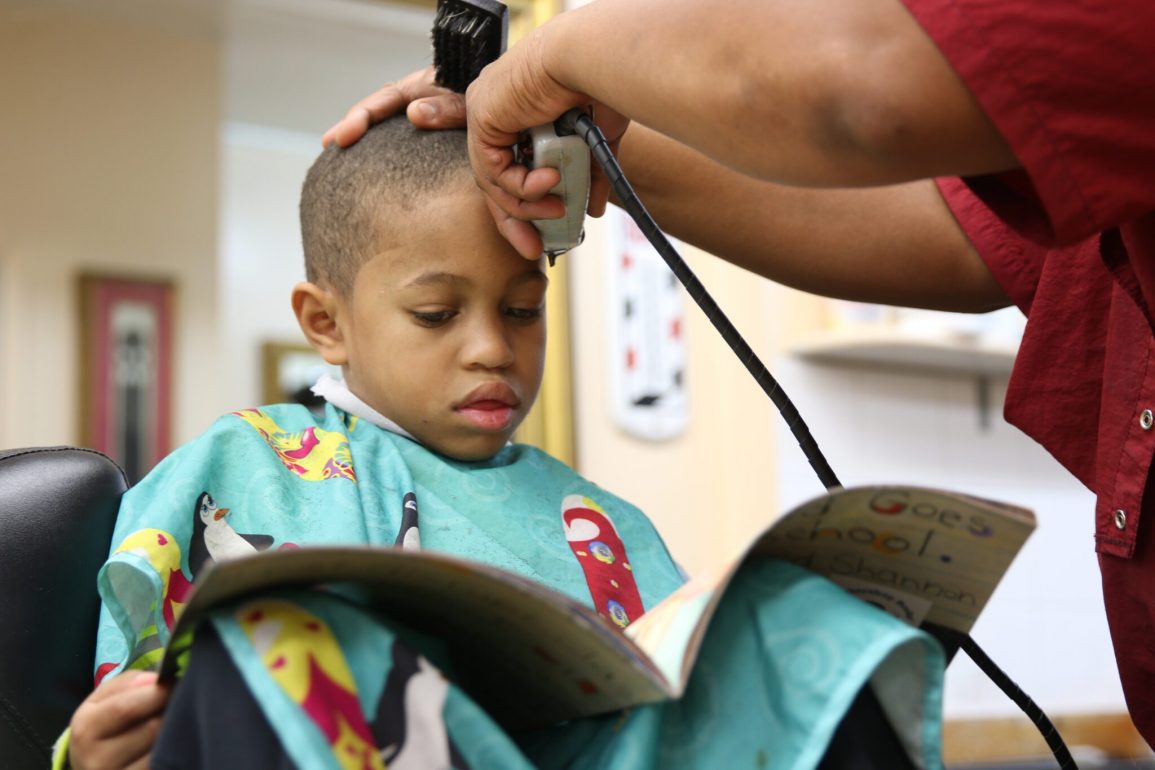“I’m a reader!”
These are magic words for Alvin Irby, a former teacher and the founder and executive director of Barbershop Books. Created in 2013, Barbershop Books is a nonprofit organization that distributes books to barbershops across the country, provides literacy training to barbers and inspires Black boys to read for fun.
A chance encounter with a student was the inspiration behind Barbershop Books. While Irby was getting a haircut, he noticed one of his first-grade students looking bored and antsy in the chair sitting next to him. “All I kept thinking the whole time was he should be practicing his reading right now. I wished I had a children’s book to give him, but I didn’t,” said Irby. As a Black man and an educator, Irby recognized that a barbershop setting presents a unique opportunity for educational support and enrichment.
Barbershops are not simply places where Black boys get a haircut a few times each month, but rather, places where they bond with and learn from Black men. According to the Pew Research Center, less than 7 percent of public school teachers are Black men. Irby believes that an absence of Black reading role models at school and at home can contribute to decreased reading motivation and poor reading performance, but barbers can help close the gap by encouraging young boys to read.
Instead of rifling through old magazines, boys at participating barbershops can choose from a wide range of stimulating, funny books geared toward children. The bookshelves are intentionally kid-sized, and the material is chosen based on the recommendations of young Black boys. Barbershop Books has distributed over 50,000 books and partnered with over 250 barbershops in over 50 cities. “Every inch in a barbershop is valuable real estate, so if a barbershop owner lets you keep something in their shop, it is generally because it adds value. So the fact that we have all these barbershops that continue to remain program partners year after year is a testament to the efficacy and the value of the program,” said Irby.
This year, Barbershop Books partnered with the National Football League (NFL) and the Las Vegas Clark County Library District to sponsor Barbershop Books programming in 10 new participating barbershops in Las Vegas. During Super Bowl week, the NFL Commissioner and 20 former NFL players helped them give away free haircuts and more than 1,000 children’s books. Although the program is intentionally non-rostered and its drop-in nature makes it challenging to quantify the number of boys Barbershop Books impacts, the organization estimates it reaches 15,000 boys annually. One of those boys, Kayden Hern, is a ten-year-old from Harlem and a former New York State Youth Poet Laureate who is often found reading at his local barbershop.
👉 Watch “Clark County Library District Celebrates Local Launch of Barbershop Books”
Although Irby is the leader of an organization dedicated to inspiring kids to read for fun, he admits that he did not enjoy reading as a child. His mother was an elementary school teacher who practiced reading lessons with him and expected him and his siblings to read proficiently, but he never saw her curl up and enjoy a good book. Irby now recognizes that there is an important distinction between reading identity and reading proficiency. When people hear about Barbershop Books, they typically think that the program helps kids develop a love of reading. Irby believes children can fall in and out of love with interests, just like adults, but when kids identify as readers it becomes a part of who they are and their regular practices and habits. The organization’s work, therefore, “is not just to help kids develop a love for reading, but to create the type of conditions and curate the type of content that cultivates Black boys’ reading identity.”
Susan B. Neuman, professor of Childhood and Literacy Education at New York University and specialist in early literacy development, conducted a two-year evaluation of the Barbershop Books program in Philadelphia. In a new report exclusively shared with Early Learning Nation, Neuman found that the presence of books at participating barbershops and barbers’ support for reading positively affected self-image and Black boys were more likely to identify as readers. The study divided barbershops into control and treatment sites and worked with local Historically Black Colleges and Universities (HBCU) students to observe children’s behavior and reading patterns. The treatment sites were given a bookcase filled with books geared toward children, and barbers received literacy training.
Neuman says, “Students appeared to benefit from the program in their views of reading as fun and cool, and scored statistically higher in identifying themselves as readers compared to the control group.” That finding is particularly meaningful for Irby. Barbershop Books has been cultivating the reading identity of Black boys for the past decade, but this is the first time that independent research has shown how their programming impacts reading behavior. To Irby’s knowledge, this is the first time an organization has demonstrated that an intervention has significantly impacted the reading identity development of children.
Books at participating barbershops are all “boy-approved,” meaning selections are made based on what children in Barbershop Books’ target demographic are most interested in reading. The vast majority of boys express that they enjoy reading funny books. Survey results from Scholastic’s Kids and Family Reading Report echo this trend. Scholastic found that more than half of children look for books that make them laugh and that humor is the top criteria that kids consider when selecting their reading material.
Funny, silly books can make reading a fun and positive experience for children and encourage them to read more often. It seems like a simple formula: understand what kids like and make that content more readily available to boost reading engagement. However, Irby believes that “many adults have opinions about what children should be reading, and far too often those opinions are not informed by the actual interests or preferences of children.” That’s one of the reasons he created Reading So Lit, a reading identity exploration and assessment platform that helps children better understand and articulate their reading preferences. The tool asks children about their interests and invites them to reflect on things like their favorite genre or their favorite reading spot in an effort to capture their reading attitudes and behaviors. The platform collects data that helps educators develop curriculum that is more relevant and engaging for students and can accelerate their reading achievement. Last year, Reading So Lit won a global education technology competition and was recognized as a catalyst in the field.
Barbershop Books recently launched “Reading So Lit Summer.” This virtual 2-week reading identity exploration program inspires boys to read for fun, and trains high school students of color to lead interactive literacy lessons. In turn, the program can inspire more Black teens to become educators and give young boys relatable literacy role models. The program has already made a profound impact. Teacher and caregiver surveys from the pilot program found that “Reading So Lit Summer” increased student vocabulary and world knowledge, increased reading self-efficacy and confidence, improved reading engagement and motivation, and supported positive reading identity development.
Our nation is in the midst of a literacy crisis that requires innovative solutions. More than 80 percent of Black fourth-grade boys in the United States are not proficient in reading, and reading scores have fallen to their lowest levels in decades. It is time to think beyond phonics and boosting proficiency scores and to understand what kids are actually interested in reading, the conditions in which they like to read, and how to make reading a natural part of children’s routines.
“If as soon as the school day ends kids don’t want to touch a book, and as soon as the school year ends and they are not reading anything at all, then a lot of those gains in proficiency are lost,” said Irby. That is precisely why Barbershop Books is “unapologetically” and “doggedly” focused on reading identity development. The organization is part of an emerging field that emphasizes the non-academic elements of reading success such as reading identity, confidence and motivation that have not traditionally been the focus of literacy assessments. These elements are essential for sustaining reading progress and encouraging kids to read for fun and for themselves. Irby believes that cultivating reading identity is especially important in this time of budget cuts, library closures and book bans so that children are motivated to read outside of school hours and are passionate about reading regardless of external factors.
Barbershop Books has taken a unique, innovative approach that helps kids develop a lifelong relationship with reading and empowers them to say words that unlock a world of possibilities, “I’m a reader!”
To learn more about Barbershop Books, click here. To apply to the “Reading So Lit Summer” program, click here.

Elise Anderson
Elise Anderson is a recent graduate from the Department of Urban Policy and Planning at Hunter College where she earned her M.S. in Urban Policy and Leadership. She is also the Communications Manager at Vote Mama, the leading source of research and analysis about the political participation of mothers. Anderson worked previously as a congressional press secretary and campaign manager, and has a passion for policy and supporting working families.



